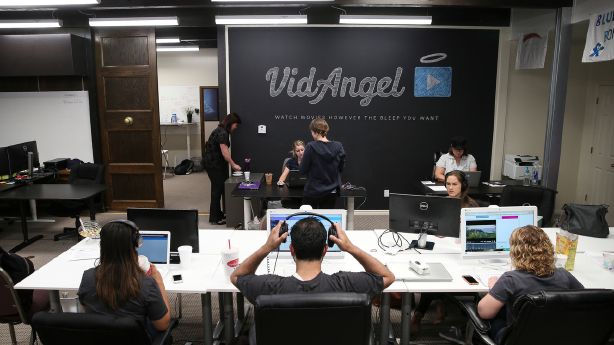Hollywood vs. VidAngel: A look at the legal battle over the Utah-based streaming service
Published at | Updated at
SALT LAKE CITY — A federal judge granted a preliminary injunction against video streaming service VidAngel on Monday.
For families and individuals hungry for a way to edit or filter some of their favorite films, VidAngel came to the rescue. But four major Hollywood studios said VidAngel — no matter how beloved — is breaking the law and sued the company.
On Monday, Judge Andre Birotte Jr., of the Central District Court of California, ruled that while the case is being decided in court, the streaming company needs to discontinue its current model of video streaming.
We’ve spoken with stakeholders and experts to help break down the details for those wanting to learn more about this case and its background.
The latest
Basically, the judge needed to decide whether or not it was in the public’s interest to close VidAngel down during court proceedings. Prior to Monday’s decision, VidAngel attorney David Quinto said the company would be in “a world of hurt” if the injunction was granted.
Birotte said in his ruling that while “VidAngel argues that the public interest in protecting every person’s right to watch filtered content in private would be severely undercut by the issuance of a preliminary injunction,” the argument “strongly relies” on VidAngel’s claim that it is “the only filtering service under the (Family Movie Act) that supports streaming digital content to mobile devices, tablets and smart TVs.”
However, Birotte pointed to a similar company, ClearPlay, that offers authorized streaming through Google Play’s service.
Because of this, he said, it is clear that “the public interest can only be served by upholding copyright protections and correspondingly, preventing the misappropriation of skills, creative energies and resources which are invested in the protected work,” he said, quoting an earlier ruling. “Accordingly, the court concludes that a preliminary injunction is in the public interest.”
VidAngel responded to the ruling by saying it’s not giving up the fight.
“Hollywood studios have followed a repeated pattern in their decadeslong campaign to put movie filtering services out of business by seeking a shut-down decision in trial court,” Neal Harmon, CEO of VidAngel, said in a statement. “Previously, such a decision has signaled the end of the legal battle.
“As such, while we are extremely disappointed — for the countless people who rely on our service regularly to enjoy movies using filters — our customers have given us not just the mandate to fight this battle all the way to the Supreme Court, but the financial resources as well. We will aggressively pursue an appeal and take this case to a higher level where we have always believed we will ultimately prevail.”
The case
Utah-based VidAngel offers customizable filters for streaming movies. Viewers can “watch however the bleep you want,” as the company’s tag line goes.
This video featuring Matt Meese of “Studio C” — playing both Satan and St. Peter — explains the company’s business model:
Some powerful Hollywood names — Disney, Lucasfilm, Warner Bros. and Twentieth Century Fox — claim the practice is copyright infringement.
Both parties have high-powered lawyers on their side. In the studios’ corner are attorneys with extensive background in copyright cases, and who played a role in helping 18,000 same-sex marriages get recognized after the passage of Proposition 8 in California.
VidAngel’s attorneys include folks from Baker Marquart — also with litigation experience in copyright litigation— and Quinto, formerly an attorney for the Academy of Motion Picture Arts and Sciences, with background in intellectual property, copyright and unfair competition cases.
So how did a small Utah company attract a former Hollywood attorney?
“I’m at a point in my career that I have the luxury to defend things that I really believe in, that matter to me and that interest me,” Quinto said. “I believe very strongly that people should have the right to watch content however they want. … I should be free in the privacy of my home to watch as much of the motion pictures as I want and not watch as I wish.”
In addition to this, the folks at VidAngel are “very nice people who believe very strongly in what (they’re) doing,” he said.

The basics
While the ultimate outcome is far from clear, some say this case could establish legal precedent.
In early June, the studios sued VidAngel, claiming the company violated copyright law and caused irreparable harm by streaming videos without a license and bypassing encryption codes to copy and filter the DVDs.
By doing this, the studios say, VidAngel violates the Digital Millennium Copyright Act that says people are not allowed to go around a technology designed to prevent unauthorized parties from accessing a copyrighted work.
The studios also said that VidAngel’s business model allowed the company to stream movies and shows before official streaming dates, which puts the studios at risk for financial loss.
“If left unabated, VidAngel will undermine Plaintiff’s relationships with their authorized licensees and interfere with Plaintiff’s ability to negotiate with those legitimate (video on demand) services,” according to the studios’ complaint.
VidAngel says it is well within the law and is protected by the Family Movie Act, which allows individuals to edit a film in the privacy of their own home.
In July, VidAngel sued back, saying that the studios had been discriminating against its filtering service in various forms for years, possibly preventing the company from forming a partnership with Google Play and making it difficult for it to offer people the option to filter out offensive or otherwise undesirable content.
The company also rejected the studios’ claim that VidAngel made unauthorized copies of films or TV shows, saying it buys a physical DVD or Blu-ray for every film that is streamed through its site. Each time someone buys a movie from VidAngel, that movie’s bar code is registered, preventing anyone else from using the same copy of the film at the same time, When a customer is done watching the movie, he or she can choose to keep the movie or sell it back.
The studios allege that VidAngel’s current model is flawed, allowing viewers to filter out only the beginning and ending credits of a movie and essentially watching the film unfiltered.
In its countercomplaint, VidAngel said there was previously an option for users to filter out the opening and closing credits of a movie, but it was not aware of users being able to watch an entire movie unfiltered.

What the studios have to say
In late August, Disney, Fox and Warner Brothers released a joint statement on the case:
“VidAngel continues to invoke the Family Movie Act (FMA) to distract from its unauthorized activities. Plaintiffs are not challenging the FMA; rather, they are challenging VidAngel’s unlicensed streaming service. As stated in the complaint: ‘Nothing in the FMA gives VidAngel the right to copy or publicly perform’ Plaintiffs’ copyrighted movies and television shows without authorization. Nor does the FMA give VidAngel the right to circumvent the technological protection measures on DVDs and Blu-ray discs.'”
When asked whether the studios would allow for a filtering service if VidAngel hypothetically were to purchase a streaming license, the three studios had no comment.
According to Quinto, the studios may not be able to sell a streaming license to VidAngel anyway because they have entered into a collective bargaining agreement with the Directors Guild of America that restricts the studios from allowing films to be filtered, other than for network purposes.
What’s next?
About a week before Monday’s hearing, Quinto and Harmon seemed confident that the injunction would not be upheld.
“I really felt like that judge is taking the case seriously. He sees what’s at stake for people who are using VidAngel’s service,” Harmon said.
When asked what the company would do if the court ruled against it, Harmon said VidAngel “(intends) that the outcome of this litigation long term is that families have a way to filter on modern devices.”
Up until Monday’s ruling, things seemed to be business as usual. The company kept its users updated with the latest on the court case on its blog and also released a series of cheeky ads, again partnering with Meese to answer questions on whether VidAngel ruins art, practices censorship and is legal.
The company had also raised more than $10 million from customers in a miniature initial public offering earlier this year.
Expert opinion
VidAngel is “in the view of these studios, streaming the copies illegally,” said Jeffrey Hunt, a media and First Amendment law attorney based in Utah.
Under the company’s current model, someone can buy a DVD for $20, stream it with a filter, then when finished, sell the movie back to VidAngel for $19. VidAngel says it keeps the DVDs in a vault, storing each movie for customers unless the customer requests to buy the physical copy.
This could be seen as “sort of ‘wink wink everybody knows that this is just a video on demand service,'” Hunt said.
Because it is selling the movies instead of renting them, VidAngel claims that it should not have to pay a streaming license. The studios disagree.
“If a court rules in favor of VidAngel, it will undermine the studios’ relationships with their authorized licensees and cause significant disruption to their business,” Hunt said.
Companies like Amazon have authorized licenses to stream, but customers have to pay more that $1 or $2 to stream the content.
A “big piece” of the lawsuit, Hunt said, revolves around the complaint that VidAngel bypasses the encryption on the DVDs to filter the movies. VidAngel claims it can legally do this because of the Family Entertainment and Copyright Act.
“The case is significant because this is a new business model for video on demand which VidAngel maintains is legal under copyright law. A court will need to decide if that is the case,” Hunt added in an email. “If VidAngel is bypassing the encryption on the DVDs and Blu-rays for the purpose of making copies of the content, that would be significant because the studios have not provided consent to VidAngel to do so, nor does VidAngel have a license to stream the studios’ copyrighted works.”
Although Hunt said he did not know enough about the specific case to comment on who he thought would come out on top, he said the case “certainly raises some cutting-edge and novel issues in the copyright.”
“This is going to be hard fought on both sides,” he said.
The parties will reconvene in court Monday, Dec. 19, when the judge will hear arguments for the studios’ motion to dismiss VidAngel’s counterclaim.
This article was originally published on KSL.com. It is used here with permission.


